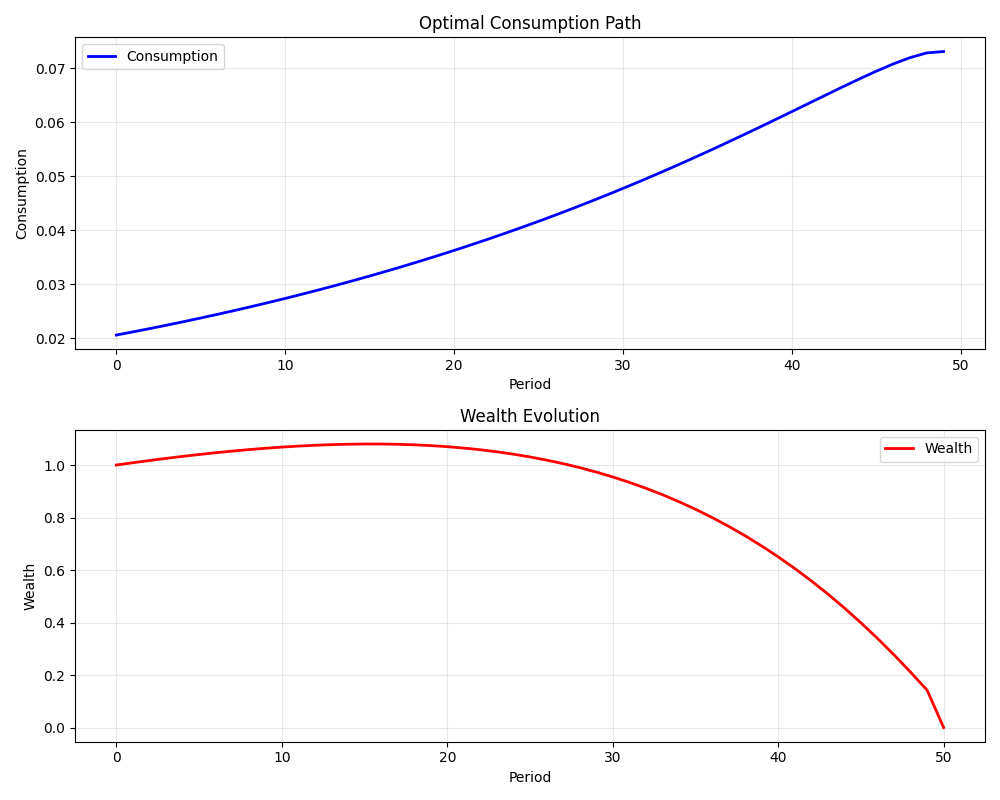Note
Go to the end to download the full example code.
Basic Consumption-Savings Model¶
This example demonstrates how to create and solve a basic consumption-savings model using scikit-agent. The model represents an agent who must decide how much to consume and save in each period to maximize lifetime utility.
This is a fundamental model in macroeconomics and serves as a building block for more complex economic models.
# Authors: scikit-agent team
# License: MIT
import numpy as np
import matplotlib.pyplot as plt
# For now, we'll create a simple placeholder example
# In the future, this would use actual scikit-agent classes
print(__doc__)
Model Setup¶
We start by setting up the parameters for our consumption-savings model. The agent lives for T periods and must decide in each period how much to consume versus save for the future.
# Model parameters
T = 50 # Number of periods
beta = 0.95 # Discount factor
sigma = 2.0 # Coefficient of relative risk aversion
r = 0.03 # Interest rate
# Initial wealth
W0 = 1.0
print("Model parameters:")
print(f" Periods (T): {T}")
print(f" Discount factor (β): {beta}")
print(f" Risk aversion (σ): {sigma}")
print(f" Interest rate (r): {r}")
Model parameters:
Periods (T): 50
Discount factor (β): 0.95
Risk aversion (σ): 2.0
Interest rate (r): 0.03
Solution Method¶
For this simple example, we’ll solve the model analytically. In practice, scikit-agent would provide numerical solution methods.
# Analytical solution for consumption in each period
def consumption_rule(t, W, T, beta, sigma, r):
"""
Analytical consumption function for finite horizon problem.
Parameters
----------
t : int
Current period
W : float
Current wealth
T : int
Total periods
beta : float
Discount factor
sigma : float
Risk aversion
r : float
Interest rate
Returns
-------
float
Optimal consumption in period t
"""
# Simplified consumption rule (approximate)
periods_left = T - t
if periods_left > 0:
# Consumption rate increases as we approach end of life
consumption_rate = 1 / (1 + beta * periods_left)
return consumption_rate * W
else:
return W # Consume everything in last period
Simulation¶
Now we simulate the optimal consumption and wealth paths.
# Arrays to store results
consumption = np.zeros(T)
wealth = np.zeros(T + 1)
wealth[0] = W0
# Simulate the optimal path
for t in range(T):
# Calculate optimal consumption
consumption[t] = consumption_rule(t, wealth[t], T, beta, sigma, r)
# Update wealth for next period
if t < T - 1:
wealth[t + 1] = (wealth[t] - consumption[t]) * (1 + r)
print("\nSimulation completed!")
print(f"Initial wealth: {wealth[0]:.3f}")
print(f"Final wealth: {wealth[T]:.3f}")
print(f"Average consumption: {np.mean(consumption):.3f}")
Simulation completed!
Initial wealth: 1.000
Final wealth: 0.000
Average consumption: 0.044
Visualization¶
Let’s plot the consumption and wealth paths over time.
fig, (ax1, ax2) = plt.subplots(2, 1, figsize=(10, 8))
# Plot consumption over time
ax1.plot(range(T), consumption, "b-", linewidth=2, label="Consumption")
ax1.set_xlabel("Period")
ax1.set_ylabel("Consumption")
ax1.set_title("Optimal Consumption Path")
ax1.grid(True, alpha=0.3)
ax1.legend()
# Plot wealth over time
ax2.plot(range(T + 1), wealth, "r-", linewidth=2, label="Wealth")
ax2.set_xlabel("Period")
ax2.set_ylabel("Wealth")
ax2.set_title("Wealth Evolution")
ax2.grid(True, alpha=0.3)
ax2.legend()
plt.tight_layout()
plt.show()

Analysis¶
The results show the typical pattern for a finite horizon consumption problem: consumption increases over time as the agent approaches the end of life, and wealth decreases correspondingly.
print("\nAnalysis:")
print(f" Consumption in first period: {consumption[0]:.3f}")
print(f" Consumption in last period: {consumption[-1]:.3f}")
print(f" Total consumption: {np.sum(consumption):.3f}")
print(f" Wealth depletion: {(W0 - wealth[T]) / W0 * 100:.1f}%")
Analysis:
Consumption in first period: 0.021
Consumption in last period: 0.073
Total consumption: 2.181
Wealth depletion: 100.0%
Total running time of the script: (0 minutes 0.202 seconds)